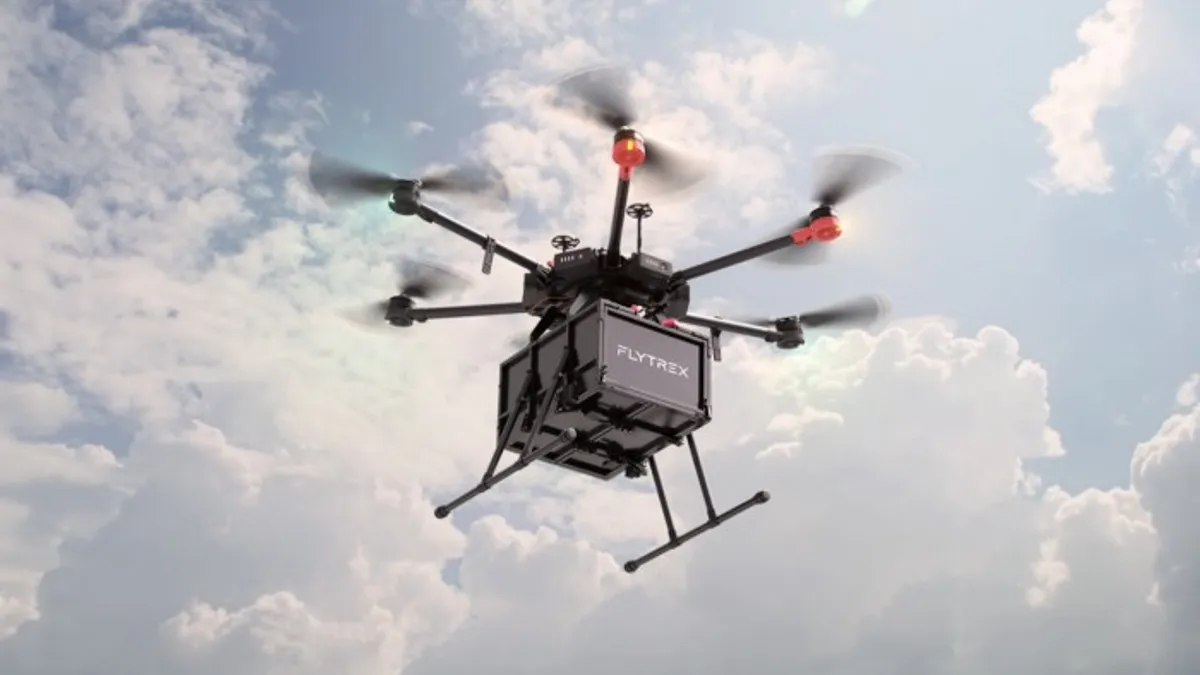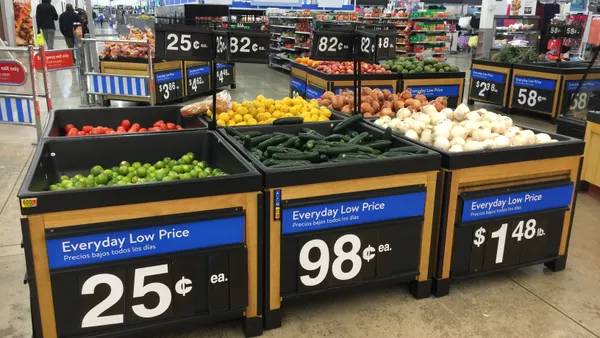Dive Brief:
- Flytrex is expanding its drone delivery program in Fayetteville, North Carolina, after getting approved for a Federal Aviation Administration permit to fly over people, the company announced in an emailed press release this week.
- The service will deliver orders from Walmart and local stores that are placed through a Flytrex application, which will then provide updates on the delivery's status.
- The permit allows Flytrex to make deliveries up to a mile away from retailers, which will put more than 2,000 homes in the services delivery area. It expects to make "hundreds" of deliveries every week, a Flytrex spokesperson said.
Dive Insight:
The expansion of the Flytrex program comes almost two years after the drone company announced its original food delivery pilot program in North Carolina. In the pilot, the drones followed a single set route over unpopulated areas from a distribution center to an outdoor recreational area.
Last year, Walmart and Flytrex announced they were going to expand into home deliveries. And with this latest permit from the FAA, delivery can now be offered to more homes.
The drone is able to carry 6.6 pounds and is able to fly 3.5 miles and back, according to Flytrex's website. Walmart said in its announcement of the partnership last year that it would deliver "select grocery and household essentials" through the partnership.
Flytrex, which manufacturers the drones used for the delivery, is working with Causey Aviation Unmanned on the delivery project. CAU is a drone operator, according to filings with the FAA.
In a request for exemption filed last year with the agency, CAU and Flytrex outlined how the two companies planned to work together.
"The service is aimed primarily at customers living in detached houses with front/back yards," the filings reads. "The delivery mission is launched and operated from the Distribution Center — a controlled, sterile operational area properly fenced to ensure that access is limited to the flight crew and authorized personnel only."
The drone will hover at an elevation of about 65 feet at the delivery point and wait for the final customer to confirm the order before lowering it to the ground "using a tethered mechanism," according to the filing.
Drone delivery for the last mile is slowly starting to become a reality in parts of the country with a number of retailers and technology companies working on projects.
Earlier this month, Kroger announced a drone delivery pilot project in Centerville, Ohio. Some drone companies are pitching themselves as a way to deliver COVID-19 vaccines in rural areas, according to The Washington Post.
Amazon was given FAA clearance to test its delivery drones on a rural test range last year and is also testing the technology in the U.K., Austria, France and Israel, according to the retailer. And UPS has been making commercial drone deliveries through its Flight Forward subsidiary for more than a year, most recently announcing a partnership with Verizon to test 5G networks for drone delivery.
Walmart's history of patent filings connected to drone delivery highlights the company's interest in the technology. Its filings include designs for a delivery station that allows for drone deliveries to be easily transferred to the inside of a building and a system for monitoring the maintenance needs of drones in a delivery network.
Some communities have already had drone delivery for over a year at this point, giving researchers a chance to study the reception of the technology. Alphabet's Wing has been testing drone delivery in Christiansburg, Virginia, since October 2019. Last year, Virginia Tech surveyed 821 people in the Christiansburg community to get their opinions on the technology.
The Virginia Tech researchers found that 87% of respondents liked the idea of drone delivery and that 89% would use the service with more than 14% saying they had already used it.
"These results are all significantly more favorable than other recent studies on the same topic but whose survey populations had no firsthand experience," the researchers concluded. The findings are likely encouraging to companies that have invested significant time and resources into proving that drone delivery is a viable last-mile solution. Knowing that the community won't sour to the technology will be helpful as logistics planners begin to implement this option.














